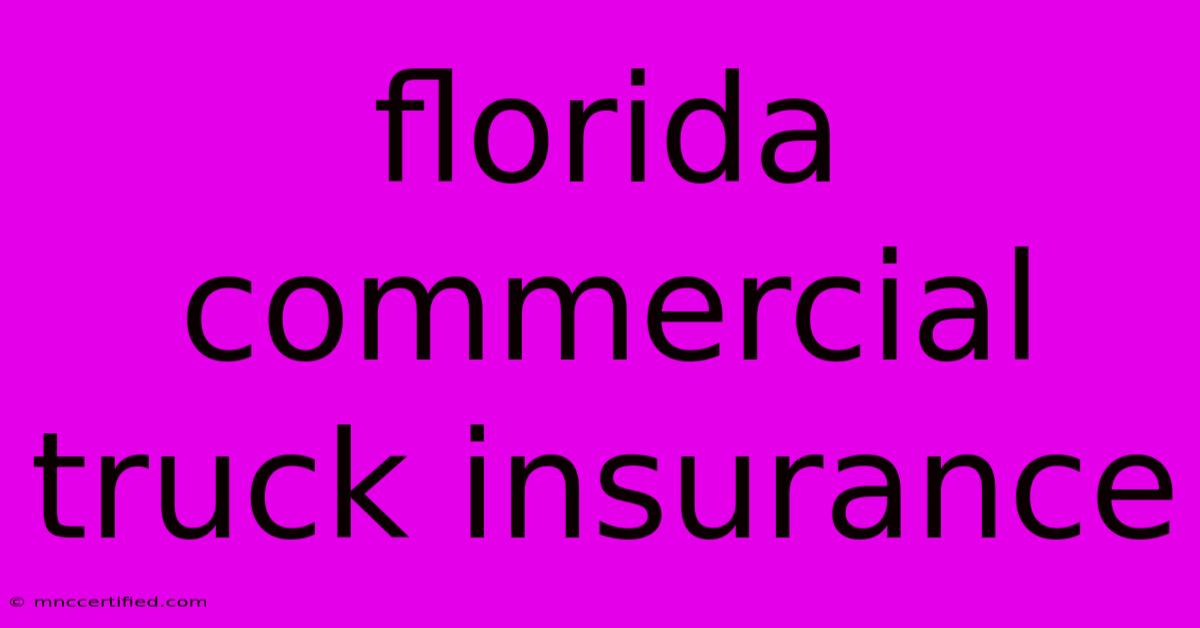Florida Commercial Truck Insurance

Table of Contents
Navigating the Complexities of Florida Commercial Truck Insurance
Finding the right Florida commercial truck insurance can feel like navigating a maze. The Sunshine State's unique regulations and the inherent risks associated with operating commercial vehicles demand a thorough understanding of coverage options. This comprehensive guide will help you understand the nuances of Florida commercial truck insurance, ensuring you're adequately protected.
Understanding Your Needs: Types of Florida Commercial Truck Insurance
Before diving into specific policies, it's crucial to assess your business's individual needs. The type of coverage you require depends on factors such as the size of your fleet, the types of goods you transport, and your operating radius. Key types of coverage include:
1. Liability Insurance: This is the cornerstone of any commercial truck insurance policy. It protects you financially if you're at fault in an accident causing injury or property damage to others. Florida has specific minimum liability requirements, but exceeding these minimums is strongly recommended to safeguard your business against significant financial losses.
2. Physical Damage Insurance: This covers damage to your own trucks, trailers, and cargo. It can include coverage for collisions, fire, theft, and vandalism. Consider the value of your assets when determining the appropriate coverage level.
3. Cargo Insurance: If you transport goods for others, cargo insurance protects you against losses or damage to the cargo during transit. This is vital for maintaining client relationships and avoiding costly financial repercussions.
4. Bobtail Insurance: This specialized coverage protects you when your truck is not attached to a trailer. It's crucial for owner-operators who frequently operate without a trailer.
5. Non-Trucking Liability Insurance: This protects you if an accident occurs while your truck is not engaged in commercial activity. It bridges the gap between your commercial and personal auto insurance.
6. Umbrella Insurance: This provides additional liability coverage beyond the limits of your primary policy, offering an extra layer of protection against significant lawsuits.
Key Considerations for Florida Commercial Truck Insurance
Florida's commercial trucking industry is heavily regulated. Several key factors must be considered when securing your insurance:
-
Safety Ratings: Maintaining a strong safety record can significantly impact your insurance premiums. Investing in driver training and implementing rigorous safety protocols is vital.
-
FMCSA Compliance: Compliance with Federal Motor Carrier Safety Administration (FMCSA) regulations is mandatory. Failure to comply can result in hefty fines and may affect your insurance eligibility.
-
Motor Carrier Act (MCA): Be aware of the requirements of the Motor Carrier Act, particularly regarding minimum insurance limits.
-
Choosing the Right Provider: Shop around and compare quotes from multiple insurers specializing in commercial trucking insurance. Don't solely focus on price; consider the insurer's reputation, claims handling process, and customer service.
How to Find the Best Florida Commercial Truck Insurance
Finding the right policy involves proactive steps:
- Assess your needs: Carefully analyze your business operations to determine your specific coverage requirements.
- Get multiple quotes: Obtain quotes from several reputable insurers specializing in commercial trucking.
- Compare coverage and premiums: Don't just look at the price; compare the scope of coverage offered.
- Review policy details: Thoroughly understand the terms, conditions, and exclusions before signing.
- Maintain good driving records: A clean driving record will contribute to lower premiums.
Protecting Your Business: The Bottom Line
Obtaining adequate Florida commercial truck insurance is not just a legal requirement; it's a crucial step in protecting your business's financial stability and future. By understanding the various coverage options and taking proactive steps to secure the right policy, you can mitigate risks and ensure your operations run smoothly. Remember to regularly review your policy to ensure it continues to meet your evolving needs. Don't hesitate to consult with an insurance professional specializing in commercial trucking insurance for personalized advice.

Thank you for visiting our website wich cover about Florida Commercial Truck Insurance. We hope the information provided has been useful to you. Feel free to contact us if you have any questions or need further assistance. See you next time and dont miss to bookmark.
Featured Posts
-
Latin Grammy Awards 2024 Highlights
Nov 15, 2024
-
Venezuela Holds Brazil To Historic Draw At Home
Nov 15, 2024
-
Better Trailer Robbie Williams Cgi Monkey Transformation
Nov 15, 2024
-
Wordle Answer November 14 1244 Solution
Nov 15, 2024
-
Larryhot Trading Co Limited Website
Nov 15, 2024